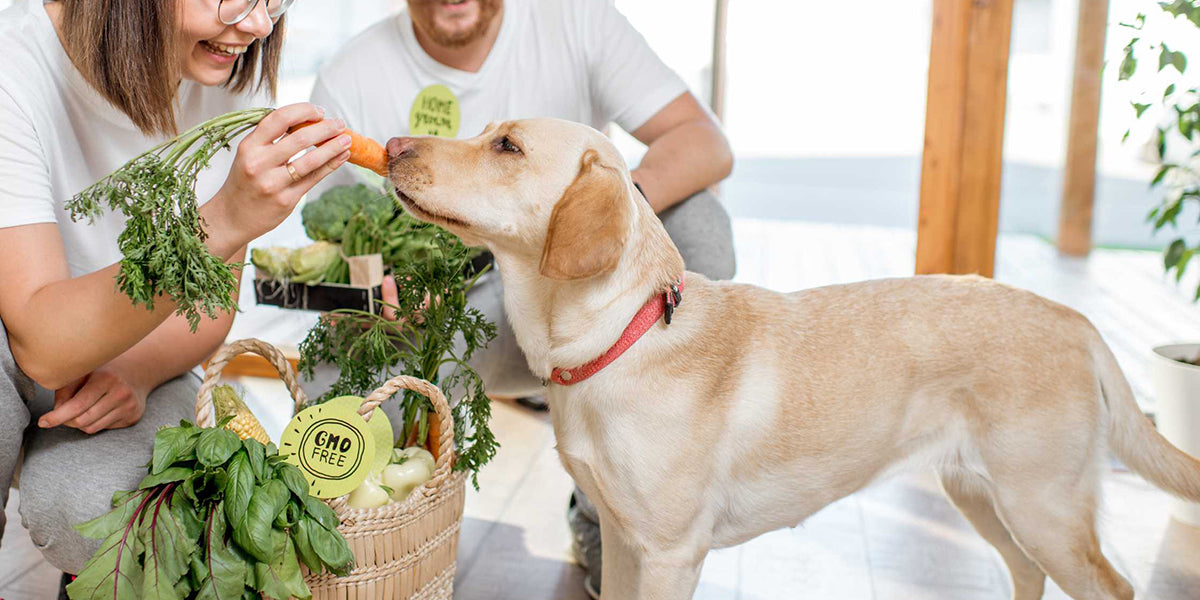Recognising the symptoms of joint pain in your dog is crucial for their well-being.
Joint pain can be both physically and emotionally distressing, as well as creating mobility issues in dogs that affect their overall happiness. it's essential to be well-informed about the causes, diagnosis, and treatment options for canine joint pain.
By spotting signs of canine joint discomfort, such as stiffness, limping, or reluctance to engage in activities, pet owners can take proactive steps to manage pain effectively. Additionally, early intervention can help prevent the progression of conditions like osteoarthritis, which, if left untreated, can lead to more severe discomfort and limited mobility.
Joint pain in dogs is prevalent due to a combination of factors such as:
- the ageing process
- genetics
- breed predispositions
These all make some dogs more susceptible to joint issues. Also, lifestyle factors such as obesity, injuries, overexertion, and even insufficient exercise can also contribute to joint pain.
Thankfully, effective remedies exist such as natural dog supplements. PetWell MOBILITY Hip + Joint Relief is designed for pets of all age groups, with the specific aim of alleviating joint pain.
The wear and tear on joints over time, much like in humans, can lead to conditions like arthritis in dogs, causing stiffness and discomfort. Maintaining a healthy weight, providing breed and age-appropriate exercise, and ensuring a balanced diet are essential steps to promote joint health and reduce the risk of joint pain in dogs.
In this comprehensive guide, we'll delve deep into the world of joint health for dogs, covering everything from symptoms, and underlying causes of joint pain to effective treatments, all-natural supplements, and preventive measures. Additionally, we'll explore pain management strategies, and provide valuable insights into maintaining optimal joint health for your beloved pooch.
Symptoms of Joint Pain in Your Dog
Common signs to watch for include:
- Limping or Lameness: Dogs with joint pain often show signs of limping, favouring one leg, or exhibiting lameness, especially after exercise or rest.
- Stiffness: Dogs with joint issues may have difficulty getting up, climbing stairs, or moving around, particularly when they first wake up in the morning.
- Decreased Activity: A noticeable decrease in activity levels, reluctance to play, go for walks, or engage in physical activities they once enjoyed.
- Difficulty Rising: Struggling to rise from a lying or sitting position and hesitating to jump onto furniture or into a car.
- Change in Gait: An altered gait, such as a bunny hop or a shifting of weight to compensate for discomfort.
- Pain or Discomfort: Dogs may vocalise their pain through whining, whimpering, or even growling when touched.
- Swelling or Joint Enlargement: Visible swelling or an enlargement of the affected joint(s).
- Licking or Chewing: Excessive licking or chewing at a specific joint, which can indicate irritation or discomfort.
- Loss of Muscle Mass: Over time, dogs with joint pain may lose muscle mass in the affected limb due to decreased use.
- Personality Changes: Dogs in pain may exhibit changes in behaviour, such as increased irritability, aggression, or withdrawal.
- Appetite Changes: Some dogs may experience a decrease in appetite when they are in pain.
- Seeking Heat: Dogs with joint pain may seek out warm or heated areas to lie down as warmth can provide relief to their aching joints.
Dogs are often stoic creatures and may not always show obvious signs of pain. Subtle changes in their behaviours or activity levels can be indicative of joint pain.
Early recognition and intervention can significantly improve your dog's comfort and quality of life
Understanding the Causes of Canine Joint Pain
Recognising the symptoms of joint pain in your dog is the crucial first step in ensuring their well-being. However, it's equally important to move beyond recognition and delve into understanding the many potential causes behind their discomfort.
By comprehending the underlying factors contributing to your dog's joint pain, you can take informed action to provide the right treatment and care, ultimately enhancing your dog's comfort and quality of life.
To effectively manage joint pain in dogs, it's crucial to understand its root causes. Canine joint pain can arise from various factors, including:
- Osteoarthritis: A common form of joint pain in dogs, particularly as they age.
- Injury: Traumatic incidents can lead to joint pain and affect mobility.
- Genetics: Certain breeds are more prone to joint issues due to genetic factors.
- Aging: As dogs grow older, their joints naturally undergo wear and tear.
- Obesity: Overweight dogs are at a higher risk due to increased stress on their joints.
Read more here on Understanding the Underlying Causes of Joint Pain in Dogs
Joint Pain in Older Dogs
Older dogs often face unique challenges when it comes to joint pain. As they age, their joints become more susceptible to pain and discomfort. Effective treatment options for treating joint pain in older dogs include medications, physical therapy, and lifestyle adjustments. All aimed at enhancing their overall comfort and mobility.
Best Joint Supplement for Older Dogs - PetWell MOBILITY Hip + joint supplement is designed to cater to the unique needs of senior dogs.
Arthritis in Dogs
Arthritis is a leading cause of joint pain in dogs. Diagnosing arthritis in dogs and recognising its signs and symptoms is vital for early intervention.
Signs of arthritis may include stiffness, lameness, and reluctance to engage in physical activities. Timely diagnosis by a veterinarian is essential for effective management.
Exercises for Dogs with Joint Pain
Contrary to what you might think, regular, controlled exercise is crucial for maintaining joint health in dogs with joint pain. It’s a great idea to explore low-impact exercises that can help improve your dog's mobility without worsening joint pain.
Diet for Joint Health
Proper nutrition plays a significant role in maintaining joint health in dogs. We highly recommend you speak with a pet nutritionist or naturopath for dietary recommendations for joint health. In addition to appropriate diets, adding mobility supplements and functional meal toppers such as PetWell MOBILITY Hip + joint supplement for Dogs and MOBILITY + BEEF to support your dog's joint health is essential.
Medications for Arthritis in Dogs

There are various medications commonly used to manage joint pain and arthritis in dogs. Speak with a holistic veterinarian who can provide the best solution for your dog.
Managing Chronic Pain in Canines
Chronic pain can negatively impact your dog's overall well-being. Managing chronic pain in canines involves a multifaceted approach aimed at improving your dog's quality of life. Here are some effective strategies and therapies commonly used:
Medications
Your veterinarian may prescribe pain-relieving medications, such as non-steroidal anti-inflammatory drugs (NSAIDs) or opioids, to alleviate chronic pain. These medications can reduce inflammation and provide relief. But they should be administered under the guidance of a vet to monitor potential side effects.
Physical Therapy
Physical therapy can be highly beneficial in managing chronic pain. Therapists can work with your dog on exercises and modalities such as hydrotherapy. This will improve joint mobility, muscle strength, and overall comfort.
Weight Management
Maintaining a healthy weight is crucial for dogs with chronic pain, especially if the pain is related to joint issues. Excess weight puts additional strain on joints, exacerbating discomfort. A balanced diet and regular exercise can help your dog achieve and maintain a healthy weight.
Lifestyle Modifications
Adjustments to your dog's lifestyle can make a significant difference. This might include providing softer bedding. Or installing ramps or steps to help them navigate stairs or furniture, creating a comfortable and accessible living environment.
Alternative Therapies

Some pet owners explore alternative therapies like acupuncture, chiropractic care, and massage to help manage chronic pain. These approaches can provide relief and improve your dog's overall well-being.
Pain Management Plans
Working closely with a pet professional, you can develop a tailored pain management plan for your dog. This plan may involve a combination of medications, therapies, and lifestyle changes to ensure the most effective pain relief.
Regular Veterinary Check-ups
Chronic pain management requires ongoing monitoring and adjustments to the treatment plan as needed. Regular check-ups with your veterinarian are essential to assess your dog's progress and make necessary modifications.
Holistic Approaches
Holistic approaches may include:
- dietary changes
- supplementation with natural anti-inflammatories like omega-3 fatty acids found in fish
- exploring homeopathic remedies under the guidance of a holistic veterinarian.
NOTE: Every dog is unique. What works best for one may not be as effective for another. It's essential to work closely with your pet professional/s including a holistic vet, pet nutritionist, and physiotherapist. They can develop a tailored pain management plan that addresses your dog's specific needs. And provide them with the best possible comfort and quality of life.
Preventing Joint Issues in Dogs
The PetWell motto is, prevention is better than cure! Here are some practical tips and guidance on how to maintain your dog's joint health, minimising the risk of future joint problems. Read more on Preventing Joint Issues in Dogs
Prevention is better than cure!
Dog Joint Pain Home Remedies
Explore natural and home remedies that can help alleviate joint pain in dogs. These remedies can complement other treatment methods and contribute to your dog's comfort.
Here are 3 home remedies that can help alleviate joint pain in dogs:
Turmeric Paste
Turmeric contains a compound called curcumin, which has natural anti-inflammatory properties. You can make a turmeric paste by mixing turmeric powder with water to create a thick paste. Feed your dog a small amount daily, ideally mixed with their food. It can help reduce inflammation and alleviate joint pain over time. Turmeric, is found in PetWell MOBILITY Hip + joint supplement for dogs and cats.
Omega-3 Fatty Acids
Omega-3 fatty acids, found in MOBILITY supplement, have anti-inflammatory properties that can benefit dogs with joint pain. Omega 3 fatty acids help reduce joint inflammation and improve mobility. Read more on the benefits of Omega-3 fatty acids here
Warm Compresses
Applying warm compresses to your dog's sore joints can provide temporary relief. Use a clean cloth soaked in warm water. Wring it out, and gently place it on the affected joint for about 10-15 minutes. Be cautious not to make it too hot to avoid burning your dog. The warmth can help soothe joint discomfort and relax tense muscles.
Canine Joint Supplements
Canine joint supplements can play a pivotal role in supporting and improving your dog's joint health. You'll find the essential ingredients to look for in dog joint supplements for your pet in the Natural joint supplements for dogs blog.
Read more about Home Remedies for Easing Joint Pain in Your Beloved Dog
Dog Joint Health

Prioritising your dog's joint health is a continuous effort that involves various aspects of their care. Things you can do to ensure your dog's joint health:
Regular Exercise
Maintaining an appropriate level of exercise is crucial. Ensure your dog engages in regular, low-impact activities that promote joint mobility and muscle strength. Choose low-impact activities, and focus on exercises that are gentle on your dog's joints. Activities like swimming and leash walking are excellent choices.
Comfortable Environment
Provide your dog with a comfortable living environment. Ensure they have a soft and supportive bed that cushions their joints. Use ramps or steps to help them access elevated surfaces more easily.
Joint Supplements
Consider adding joint supplements like PetWell MOBILITY Hip + joint to your dog's diet. MOBILITY contains naturally occurring omega-3 fatty acids, glucosamine, and chondroitin. Which can all support joint health by promoting cartilage development and reducing inflammation.
Balanced Diet
Feed your dog a well-balanced diet that includes high-quality protein sources, essential vitamins, and minerals. Consult with a pet nutritionist to help you choose the right diet for your dog's age, breed, and any specific health concerns.
Pain Management
If your dog develops joint pain or arthritis, your Vet can create a pain management plan tailored to their specific needs. This may include medications, physical therapy, or alternative therapies.
Inflammation in Dog Joints
Understanding and managing inflammation in your dog's joints is crucial for effective pain relief and overall well-being.
To effectively manage inflammation in your dog's joints, it's essential to work closely with a holistic veterinarian and pet nutritionist to develop a comprehensive solution tailored to your dog’s specific needs.
Your vet may prescribe non-steroidal anti-inflammatory drugs (NSAIDs) or other medications to reduce inflammation and alleviate pain.
Your pet nutritionist will provide a dietary plan that includes anti-inflammatory ingredients. Such as Omega-3 fatty acids that can play a significant role in managing inflammation. Here's a list of 10 Anti-Inflammatory Foods for Your Pet
In addition, you may add supplements such as PetWell MOBILITY Hip + joint. MOBILITY contains naturally occurring glucosamine and chondroitin. Plus MSM to support joint health and helps to combat inflammation. MSM and glucosamine for dogs is a key ingredient!
Moreover, maintaining a healthy weight and providing regular, low-impact exercise can aid in managing joint inflammation.
Read more about Inflammation in Dog Joints: Understanding the Causes and Relief
Together, these strategies can help your dog find relief from inflammation. Promoting better joint function, increased comfort, and an improved overall quality of life.
In Summary
Joint pain in dogs is a multifaceted issue, but with a deeper understanding and a comprehensive approach, we can significantly improve our dog's quality of life.
Whether you're exploring Natural remedies for joint pain in dogs, considering medications, or simply seeking advice on maintaining optimal joint health, we trust this guide has provided insights and solutions to help your fur family lead a happier and pain-free life.
Remember that every dog is unique, so consulting with a pet professional for a personalised approach to your dog's joint health is always recommended.
Dog Joint Pain Product Reviews
Reviews for PetWell MOBILITY Hip + joint supplement
"Love MOBILITY, it's loaded with so many active, anti-inflammatory ingredients." - Aurora the Vet Nurse
"I started my dog on Mobility as a prevention more than anything. He is 5 years old. When I read the ingredients it included I thought it was a great idea to get on the front foot. And start him on it now to prevent mobility issues moving forward. I did ask my vet to check it and he gave it the thumbs up." - Brittany
"My two are really fussy eaters but they just love this stuff! My eldest has arthritis and taking mobility has really helped ease her movement. I was so impressed I put my youngest on thrive and he seems to love it." - Deborah
"Toby - our senior cat has been loving ‘PetWell - Hip and Joint Relief’ - I think he thinks he’s a teenaged again… highly recommend!" - Jodie
"Having a senior dog with joint and mobility issues we came across Petwell Hip & Joint Relief, what a game changer in easing her discomfort and giving her some ease of movement." - Jenny
Disclaimer
The entire contents of this email and website are not to be taken as medical advice. PetWell encourages you to make your own pet healthcare decisions based on your research and in partnership with a qualified pet healthcare professional.




















